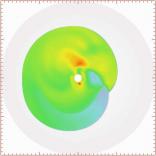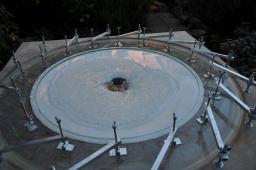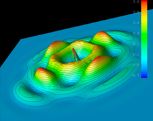SN2NS: Supernova explosions, from stellar core-collapse to neutron stars and black holes.
SN2NS is a 4-year program of the French agency ANR whose goal is the modeling of stellar core-collapse, leading to the birth of neutron stars and black holes. It involves three laboratories:
- Institut de Recherche sur les lois Fondamentales de l’Univers (IRFU) in the CEA (Saclay)
- Laboratoire Univers et Theories (LUTh) in the Observatoire de Paris (Meudon)
- Institut de Physique Nucleaire (IPN) in the Université Paris 11 (Orsay)
Contact :
see also the SN2NS dedicated scientific site
Aims
The SN2NS project gathers the expertises of three groups in IRFU (Saclay), IPN (Orsay) and LUTh (Meudon), in order to develop a numerical tool to simulate and understand the core-collapse taking place at the end of the life of massive stars exceeding 9 solar masses. The first second of the collapse determines both the onset of supernova explosions, and the birth conditions of neutron stars and black holes.
The core-collapse problem depends on the complex interplay of nuclear physics, neutrino physics, hydrodynamics and general relativity. Recent progress on the core-collapse problem has been driven by the discovery of its multidimensional nature, due to large scale hydrodynamical instabilities which break the spherical symmetry. How does the global shape of the explosion depend on the mass and spin of the progenitor ? Observable consequences are the explosion threshold of the supernova, the mass, kick and spin of the residual neutron star or black hole, and their gravitational waves signature.
The group at IRFU/SAp (T. Foglizzo) is dedicated to characterizing the hydrodynamical consequences of the multidimentional instabilities. The nuclear physicists involved at IPN (J. Margueron, E. Kahn) and LUTh (M. Oertel) will develop an equation of state adapted to the high temperatures of both neutron star and black hole formation. In order to characterize the threshold between the formation of a neutron star and a black hole, the expertise of the group of numerical relativity at LUTh (J. Novak, E. Gourgoulhon) will be crucial. The general relativistic code "CoCoNut" will be improved with a realistic equation of state and evolutive prescriptions for neutrino transport. A Newtonian version of CoCoNut will also be used at IRFU, together with the code RAMSES, to simulate stationary accretion in order to characterize the 3D evolution of the shock instability.
The major strengths of the SN2NS project come from i) the complementarity of the numerical and analytical tools for the understanding of 3D hydrodynamical processes, ii) the modelling of supernova explosion for massive progenitors including black hole formation and iii) the collaboration with nuclear physicists for an advanced treatment of the equation of state.
Advanced techniques for the visualisation of multidimensional simulations will participate to the valorisation of the results in the scientific community as well as for the public.






